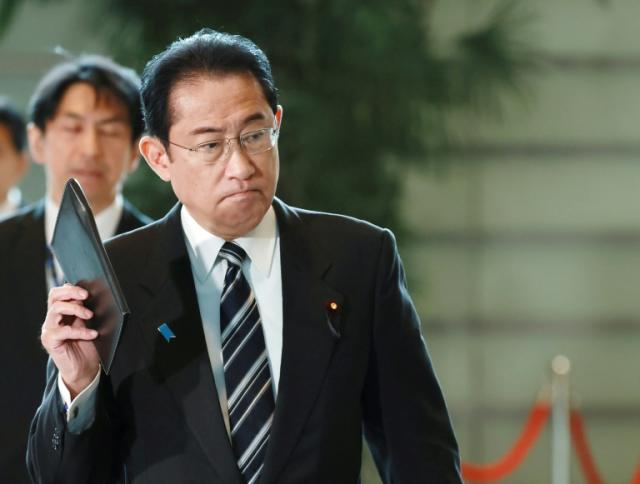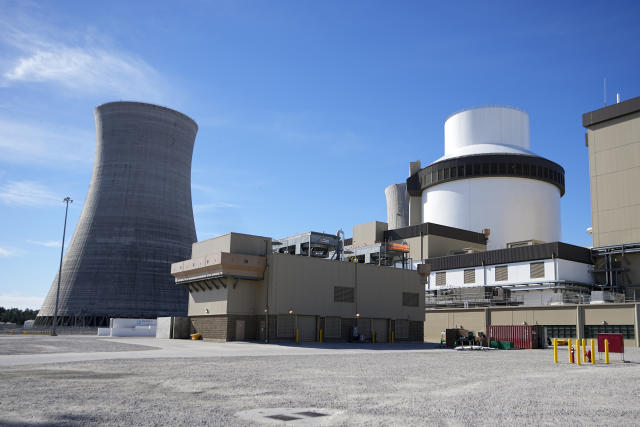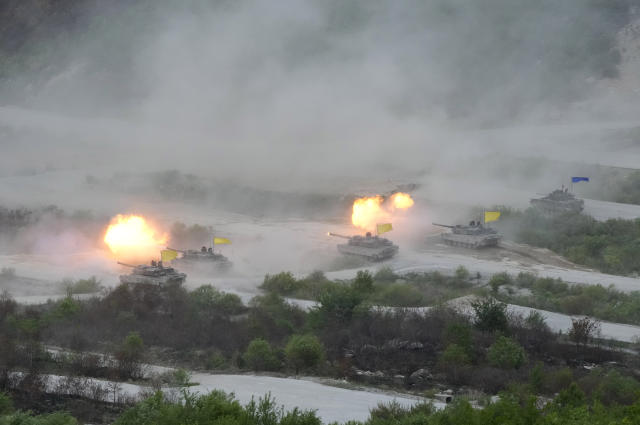World Geography And Politics Daily News | 30 May 2023

Views (215)

North Korea confirms June launch of military spy satellite: KCNA
North Korea has confirmed it will launch a reconnaissance satellite in June, saying it is needed to monitor military movements of the United States and its partners in real time, state media reported Tuesday, citing a senior defence official.That satellite, along with "various reconnaissance means due to be newly tested, are indispensable to tracking, monitoring... and coping with in advance in real time the dangerous military acts of the US and its vassal forces", the statement said.

North Korea has confirmed it will launch a reconnaissance satellite in June, saying it is needed to monitor military movements of the United States and its partners in real time, state media reported Tuesday, citing a senior defence official.
Japan said Monday it had been informed by Pyongyang that a satellite launch could happen as early as this week, but Tokyo warned the North may in fact be planning a sanctions-defying ballistic missile test.
The North's state Korean Central News Agency cited Ri Pyong Chol, vice-chairman of the ruling party's central military commission, as saying the "military reconnaissance satellite No. 1" would be "launched in June".
That satellite, along with "various reconnaissance means due to be newly tested, are indispensable to tracking, monitoring... and coping with in advance in real time the dangerous military acts of the US and its vassal forces", the statement said.
Citing "reckless" acts by Washington and Seoul, Ri said North Korea felt "the need to expand reconnaissance and information means and improve various defensive and offensive weapons" in an effort to bolster military preparedness.
The official also accused the United States of conducting "hostile air espionage activities on the Korean peninsula and in its vicinity", according to the KCNA dispatch.
North Korea informed Japan it would launch a rocket between May 31 and June 11, identifying waters near the Yellow Sea, the East China Sea and to the east of Luzon Island in the Philippines as warning areas, a Japanese coast guard spokesman told AFP.
Such zones are usually designated for falling debris or rocket stages.
Japanese Prime Minister Fumio Kishida told officials to gather intelligence "on North Korea's notification about the launch of a ballistic missile that it describes as a satellite", his office said in a tweet.
"Even if it's described as a satellite, a launch using ballistic missile technology would be a violation of United Nations Security Council resolutions" and would threaten people's safety, Kishida told reporters.
In 2012 and 2016, Pyongyang tested ballistic missiles that it called satellite launches. Both flew over Japan's southern Okinawa region.
North Korean leader Kim Jong Un this month inspected the country's first military spy satellite as it was prepared for launch, and gave the green light for its "future action plan".
- 'Cannot be justified' -
In 2021, Kim had identified the development of such satellites as a key defence project for the North Korean military.
Because long-range rockets and space launchers share the same technology, analysts say developing the ability to put a satellite in orbit would provide Pyongyang with cover for testing banned intercontinental ballistic missiles (ICBMs).
Japan's defence ministry issued an order to shoot down any ballistic missile confirmed to be on course to fall into its territory.
South Korea's foreign ministry condemned the launch plan, but officials did not confirm to AFP if Seoul had been directly notified of it.
"North Korea's so-called 'satellite launch' is a serious violation of UN Security Council resolutions banning all launches using ballistic missile technology, and is a clearly illegal act that cannot be justified under any pretext," the ministry said.
South Korea and Japan have been working to mend long-frayed ties, including with greater cooperation on North Korea's military threats.
- Unusual stance -
Meanwhile, Kishida on Monday reiterated that Tokyo is open to talks with Pyongyang.
North Korean state media on Monday published a statement from the country's vice-minister of foreign affairs, appearing to endorse a conciliatory approach to relations with Japan -- an unusual stance from Pyongyang.
If Japan avoids "being shackled by the past, and seeks a way out for improving the relations, there is no reason for the DPRK and Japan not to meet", said the statement from Pak Sang Gil, using the initials of North Korea's official name.
Pak said, however, that Japan needs to move on from sticking points such as the "abduction issue" for ties to improve.
Japan suspects dozens of people who are still missing were abducted by North Korean agents in the 1970s and 1980s to train spies in the Japanese language and culture.
cdl-tmo/sst/caw
Third nuclear reactor reaches 100% power output at Georgia's Plant Vogtle
A new reactor at a nuclear power plant in Georgia has reached its full power output for the first time and is scheduled to enter commercial operation within the next month. Georgia Power Co. announced Monday that Unit 3 at Plant Vogtle, southeast of Augusta, has reached its full output of 1,100 megawatts of electricity. Operators are conducting further testing to prove they can run the reactor in ways required for regular operations, Georgia Power CEO Kim Greene in a statement, calling the achievement “an exciting milestone.”

ATLANTA (AP) — A new reactor at a nuclear power plant in Georgia has reached its full power output for the first time and is scheduled to enter commercial operation within the next month.
Operators are conducting further testing to prove they can run the reactor in ways required for regular operations, Georgia Power CEO Kim Greene in a statement, calling the achievement “an exciting milestone.”
“It tells us we’re close to finishing the unit safely and bringing it online to power Georgia homes and businesses with reliable, emissions-free energy for decades to come,” she said.
Units 3 and 4 at Plant Vogtle are the first new reactors built from scratch in decades in the United States.
The first two reactors have been generating electricity at Vogtle for decades. A third and a fourth reactor were approved for construction at Vogtle by the Georgia Public Service Commission in 2009, and the third reactor was supposed to start generating power in 2016.
The cost of the third and fourth reactors was originally supposed to be $14 billion, but are now on track to cost the owners $31 billion. That doesn’t include $3.7 billion that original contractor Westinghouse paid to the owners after going bankrupt, which brings total spending to almost $35 billion.
In Georgia, almost every electric customer will pay for Vogtle. Georgia Power, the largest unit of Atlanta-based Southern Co., currently owns 45.7% of the reactors. Smaller shares are owned by Oglethorpe Power Corp., which provides electricity to member-owned cooperatives, the Municipal Electric Authority of Georgia and the city of Dalton. Oglethorpe and MEAG plan to sell power to cooperatives and municipal utilities across Georgia, as well in Jacksonville, Florida, and parts of Alabama and the Florida Panhandle.
Commissioners will decide later who pays for the remainder of the costs of Vogtle, including the fourth reactor.
North Korea says it will launch its first military spy satellite in June
North Korea on Tuesday confirmed plans to launch its first military spy satellite in June and described such capacities as crucial for monitoring the United States’ “reckless” military exercises with rival South Korea. The statement came a day after North Korea notified Japanese authorities that it plans to launch the satellite sometime between May 31 and June 11, and that the event may affect waters in the Yellow Sea, East China Sea and east of the Philippines’ Luzon Island. In comments published on state media, senior North Korean military official Ri Pyong Chol berated the combined U.S.-South Korean military exercises, which Pyongyang has long described as invasion rehearsals.

SEOUL, South Korea (AP) — North Korea on Tuesday confirmed plans to launch its first military spy satellite in June and described such capacities as crucial for monitoring the United States’ “reckless” military exercises with rival South Korea.
The statement came a day after North Korea notified Japanese authorities that it plans to launch the satellite sometime between May 31 and June 11, and that the event may affect waters in the Yellow Sea, East China Sea and east of the Philippines’ Luzon Island. Japanese Defense Minister Yasukazu Hamada said he ordered Japan’s Self Defense Forces to shoot down the satellite or debris, if any entered Japanese territory.
In comments published on state media, senior North Korean military official Ri Pyong Chol berated the combined U.S.-South Korean military exercises, which Pyongyang has long described as invasion rehearsals. He said North Korea considers space-based reconnaissance as “indispensable” to monitor in real time the “dangerous military acts of the U.S. and its vassal forces,” which he says are “openly revealing their reckless ambition for aggression.”
Since the start of 2022, North Korea has test-fired about 100 missiles, including intercontinental ballistic missiles designed to reach the U.S. mainland and a slew of launches it described as simulated nuclear attacks on targets in South Korea. North Korea has said its intensified testing activity is meant to counter its rivals’ joint military exercises as it continues to use those drills as a pretext to advance its arsenal of nuclear-capable weapons.
Last week, the South Korean and U.S. militaries conducted large-scale live-fire drills near the border with North Korea as the first of five rounds of exercises marking 70 years since the establishment of their alliance.
Ri said that the expanding U.S.-South Korean military exercises, combined with stated U.S. plans to send nuclear-capable submarines to dock in South Korea and the increased activities of U.S. reconnaissance aircraft in the region underline a “sinister intention” to prepare for pre-emptive military action against the North. While Washington and Seoul describe their regular military exercises as defensive, they have expanded their training since 2022 to cope with the North’s evolving threats.
“The concerning security environment prevailing in the region owing to the dangerous military acts by the U.S. and its vassal forces requires us to secure as the most pressing task a reliable reconnaissance and information means capable of gathering information about the military acts of the enemy in real time,” Ri said.
“(North Korea’s) military reconnaissance satellite No. 1 to be launched in June and various reconnaissance means due to be newly tested are indispensable to tracking, monitoring, discriminating, controlling and coping with in advance in real time the dangerous military acts of the U.S. and its vassal forces,” he added. Ri didn't specify the other reconnaissance means the North supposedly has planned.
North Korea's satellite launch would use long-range missile technology banned by past U.N. Security Council resolutions, although previous missile and rockets tests have demonstrated North Korea’s ability to deliver a satellite into space.
Spy satellites are among an array of high-tech weapons systems North Korean leader Kim Jong Un has publicly vowed to develop. Other weapons systems on his wish list include solid-propellant ICBMs, nuclear-powered submarines, hypersonic missiles and multi-warhead missiles.
North Korea placed Earth-observation satellites in orbit in 2012 and 2016. While North Korea does not notify neighboring countries of its missile firings in advance, it has issued notices ahead of satellite launches in the past.
Although North Korea with its past launches of missiles and rockets has demonstrated an ability to deliver a satellite into space, there are questions about the capabilities of its satellites. Foreign experts say the earlier satellites never transmitted imagery back to North Korea, and analysts say the new device displayed in state media in recent weeks appeared too small and crudely designed to process and transfer high-resolution imagery.
South Korea warned Monday that North Korea will face consequences if it goes ahead with its launch plan in violation of the U.N. Security Council resolutions that ban the North from conducting any launch using ballistic technology.
Newport: Photographer blends love of Africa with Welsh communities
Glenn Edwards was a steelworker before finding a love for photography in his mid 20s by chance.

Glenn Edwards has had a passion for photography since he borrowed his fathers camera on a trip to Tenerife in his mid 20s.
Since then, he's been on more than 100 foreign commissions with most of them in Africa.
The photographer and lecturer from Newport feels a special connection to the continent.
Now he is settled in Cardiff capturing the flourishing African communities across Wales.
Glenn was in his mid 20s when he borrowed his fathers Topcon RE Super.
He was a steelworker at the time but felt like he hadn't found his true passion.
"I found myself going into the markets or unusual places in Tenerife where tourists probably didn't go," he said.
"I felt that I'd found what I wanted to do with my life."
He got his lucky break while attending a photography course in his home city.
A local doctor called Theodore Griffiths was talking about his work in India and Glenn was invited to attend.
Glenn asked him whether photographs helped to promote aid work in developing causes, and Dr Griffiths said images helped to raise awareness.
He was invited over, and described the experience as "life-changing".
"I feel myself getting emotional because I'd never experienced it before and I haven't since," he said.
"Something happened to me over there."
Glenn was out there working and it led to him questioning himself for the first time.
"It was an open truck where people were going, collecting bodies from families and just throwing them on the back. I was photographing people's grief and I felt guilty," he said
"I was walking in a refugee camp in a tent and there was a woman holding her husband and he was obviously going to die.
"I could've gone in there taking pictures, but I couldn't because it was so personal. That's when I realised that I wasn't sure I was capable of going in too deep on the hard news."
These days he photographs African communities around Wales, with some of his images recently featuring in an exhibition at Aberystwyth Art Centre.
"There was a guy from Uganda walking around. He was so proud to see himself on the walls of a gallery," he said.
Such moments are what give the photographer most pride.
Glenn has focused his work on many other groups.
Founders Cathryn McShane-Kouyaté and N'famady Kouyaté set it up in 2019 'as a celebration of the richness of diversity in Wales.
"There were no West African musicians my husband could join so we started collaborating," Cathryn said.
Covid was difficult for the creative couple, but they made the most of it.
"We did some online projects and then, once the restrictions ended we hit the ground running really. We've been building to this point," Cathryn added.
Cathryn is optimistic the festival can continue to grow in the future.
"I can see us moving to reach other communities. We've had interest from other venues. Celebrating Africa and Wales and those links that we have," she said.
Tijesunimi Olakojo is a community stage coordinator for the festival. She came to Wales in November 2020 after moving to the UK from Nigeria.
An advisor from the Red Cross told her to pursue what she loved.
As a performer, her and the Successors were a match made in heaven, she believes.
The Cardiff-based group offer an African interactive music experience and a cultural exchange of percussion, music, drumming, singing, storytelling, and dance.
"I love it. I feel like it's home because I have not seen something like this before in Wales," she said.
"People here welcome outsiders and for me that a very big deal. I love the sense of community."
Martha Musonza Holman is the Founder of the Love Zimbabwe charity.
She lives in Abergavenny after being forced to flee her home country in 2001 and has worked tirelessly to create links between her adopted country and her country of birth.
"I've been very lucky because Abergavenny is a community-oriented place. So a lot of people have welcomed me. We've got so many people from different parts of the world," she said.
Her role as a teacher gives the her the opportunity to bring a bit of African culture into Welsh schools.
"We work with children, teach them African songs and raise money for the charity. So I'm part of the community and I love it. When I'm in Abergavenny I can go anywhere," she added.
Impeachment trial of Texas’ Ken Paxton to begin no later than August 28
A historic impeachment trial in Texas to determine whether Republican Attorney General Ken Paxton should be permanently removed from office will begin no later than August in the state Senate, where the jury that would determine his future could include his wife, Sen. Angela Paxton. Ken Paxton was immediately suspended from office after the GOP-controlled Texas House of Representatives overwhelmingly voted Saturday to impeach the three-term attorney general, who has been dogged by ethical and criminal accusations since taking office in 2015. Paxton is only the third sitting official in Texas' nearly 200-year history to be impeached.

The Senate unanimously adopted a measure Monday that called for the trial to begin not later than Aug. 28.
Paxton is only the third sitting official in Texas' nearly 200-year history to be impeached. He called the House investigation that led up to his impeachment “corrupt” and has broadly denied wrongdoing. The raft of accusations against him include an indictment on securities fraud charges and allegations that he misused his office to try to thwart an FBI investigation into one of his donors.
Angela Paxton has not publicly commented on the impeachment proceedings against her husband, nor has said whether she will recuse herself from the trial in the 31-member Senate, where she is one of 19 Republicans that frequently vote in lockstep.
Removing Ken Paxton from office would require a two-thirds majority.
Putin signs law denouncing arms control treaty
Russian dictator Vladimir Putin signed a bill into law on May 29 denouncing the Treaty on Conventional Armed Forces in Europe, according to a Russian government website.

Russian dictator Vladimir Putin signed a bill into law on May 29 denouncing the Treaty on Conventional Armed Forces in Europe, according to a Russian government website.
The treaty, originally signed in Paris in November 1990, aimed at arms control and was initially agreed upon by 16 NATO members and six countries of the former Warsaw Pact, including the former USSR. It officially came into effect two years later.
The decision to denounce the treaty holds little practical significance as Russia already suspended its participation in 2007 and fully withdrew from it in 2015.
0 Likes
